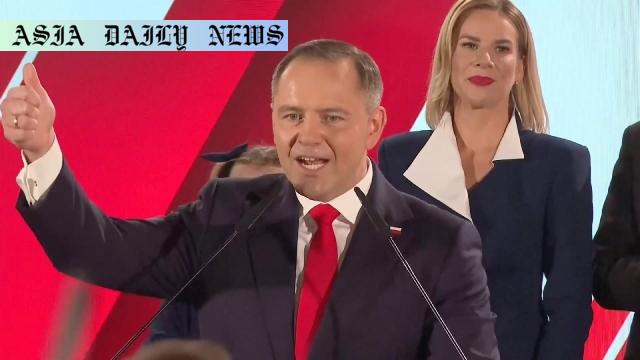Election: Right-wing Karol Nawrocki wins Poland’s presidential runoff with 50.89%, defeating centrist Rafal Trzaskowski.

Introduction: An Electorate at a Crossroads
Poland recently witnessed a momentous and fiercely contested presidential runoff election. Opposition candidate Karol Nawrocki, aligned with the nationalist conservative Law and Justice party, emerged victorious in a tight race against centrist rival Rafal Trzaskowski. Securing 50.89% of the vote, Nawrocki triumphed by a slim margin of just 1.78 percentage points, a result reflecting a deeply divided electorate. Known for drawing inspiration from former US President Donald Trump’s America First doctrine, Nawrocki’s win marks a significant political shift that will likely shape Poland’s domestic and foreign policies in the coming years.
Political Landscape: The Stakes of This Election
The election highlighted two competing visions for Poland’s future. On one side was Rafal Trzaskowski, a candidate representing the centrist Civic Platform party and aligned with Poland’s pro-European Union policies. On the other side was Karol Nawrocki, an advocate of nationalist ideals championed by the Law and Justice party, which has historically challenged the EU over judicial reforms and sovereignty issues. This election served as a referendum on these divergent paths, with Nawrocki’s victory indicating a tilt towards conservative nationalism.
Nawrocki’s Campaign: Trump-Inspired and Nationalist
Nawrocki’s campaign openly mirrored Trump’s America First policy, prioritizing national interests over globalist agendas. This resonated with a segment of the Polish electorate seeking a stronger assertion of national identity and sovereignty. The candidate also received considerable support due to his critique of Prime Minister Donald Tusk’s ruling party, which has maintained strong pro-EU commitments. By positioning himself as a defender of Polish values against perceived external interference, Nawrocki capitalized on growing Euroscepticism within certain voter demographics.
The Role of the Polish Presidency
While most executive power in Poland rests with the prime minister, the president wields significant influence through veto powers, shaping legislative directions. Nawrocki is expected to use this authority to oppose pro-EU policies championed by the Tusk administration, potentially leading to legislative gridlocks and heightened tensions within the government. His alignment with the nationalist agenda may also influence foreign policy decisions, particularly in relations with Brussels.
Potential Implications: Domestic and International
Nawrocki’s election raises important questions about the future trajectory of Poland’s domestic and international positioning. Domestically, his leadership may result in further discord with pro-European institutions and policies, deepening Poland’s political polarization. Internationally, his nationalist stance could result in strained relations with the EU, particularly over judicial independence and sovereignty disputes. As a vocal supporter of Trump’s isolationist policies, Nawrocki may also explore closer bilateral ties with the US, emphasizing national self-reliance over collective EU frameworks.
Conclusion: A New Chapter for Poland
The election of Karol Nawrocki represents a pivotal moment in Poland’s political history. As the nation grapples with balancing sovereignty, nationalism, and European integration, Nawrocki’s presidency will undoubtedly shape its course in the coming years. With a narrow victory highlighting the electorate’s division, unity will be a critical challenge for the new president as he embarks on his term. The international community will also closely watch how Nawrocki navigates the intricate balance between national priorities and global responsibilities.
Commentary
An Examination of Nawrocki’s Tightly Contested Win
Karol Nawrocki’s narrow victory in Poland’s presidential runoff election is a testament to the diverse and divided political preferences of the Polish electorate. The slim 1.78-point margin underscores just how competitive the race was and highlights the growing political polarization in the country. While Nawrocki’s nationalist and Trump-inspired policies have appealed to a section of the population, others remain wary of the implications such rhetoric might have for Poland’s democratic ideals and its place within the European Union.
The Influence of Nationalist Sentiment
Nawrocki’s campaign strategy, closely aligned with America First principles, reflects a broader trend of rising nationalist movements globally. By emphasizing sovereignty and pushing back against external influences, Nawrocki successfully tapped into a section of Polish society that feels left behind by globalization and alienated by pro-EU governance. Whether such policies can translate into meaningful progress for the nation or will exacerbate its isolation remains a pressing question. History has shown that nationalist agendas, while popular in the short term, can come with their own set of challenges.
The Road Ahead for the Tusk Administration
With Nawrocki assuming the presidency, Poland’s ruling coalition under Donald Tusk must prepare for potential vetoes and obstruction to its pro-European policies. Nawrocki’s opposition to the governing party’s initiatives may result in legislative standoffs, complicating governance and furthering political divides. Tusk’s administration will need to navigate these challenges tactfully, ensuring that progress is not hindered by what could become a fractious relationship between the presidency and the parliament.
Conclusion: Poland at a Turning Point
As Karol Nawrocki begins his term, Poland stands at a critical juncture. The president’s ability to balance nationalist aspirations with international cooperation will play a pivotal role in defining the nation’s future. While his victory marks a win for nationalist voices in Poland, it also demands careful attention to the concerns of nearly half of the electorate that voted differently. Nawrocki’s leadership will undoubtedly shape the political, economic, and social fabric of Poland in the years ahead, making it a crucial period for the country’s history.


